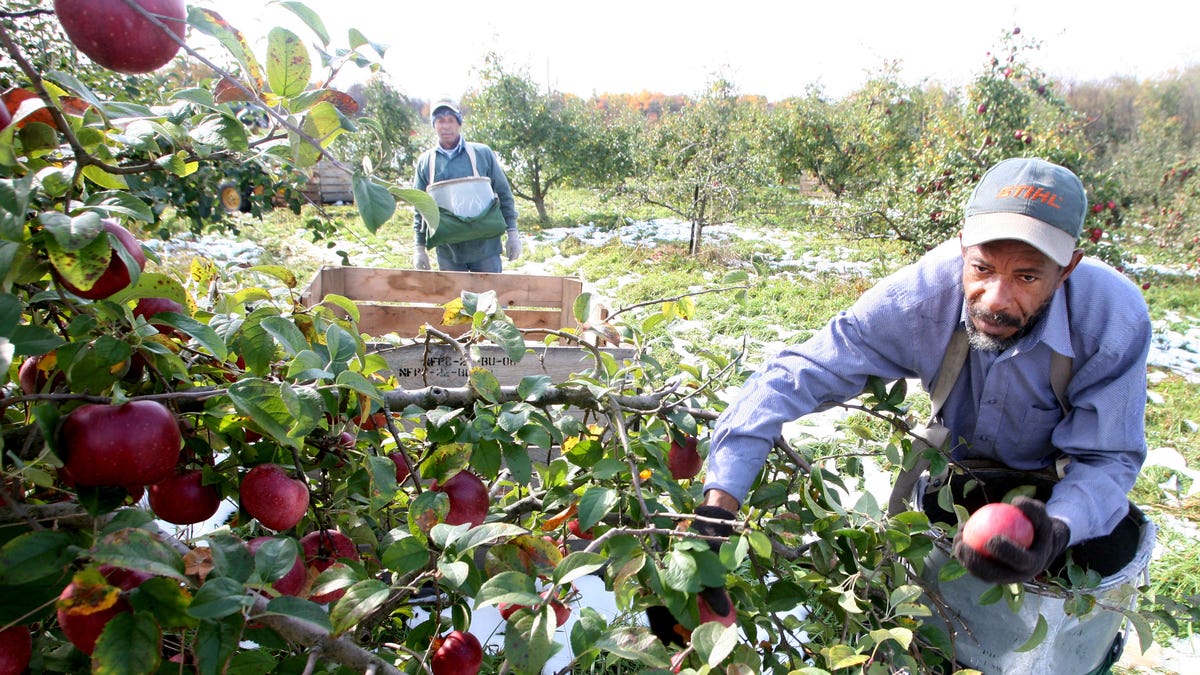
Oct. 31, 2011: Migrant farm workers, Ron Granville Bent, left, and Peter Elvy, pick York apples Monday Oct. 31, 2011 in an orchard west of Winchester, Virginia. (AP2011)
With the fall apple harvest winding down in Washington state, growers would normally be scaling back jobs, but not this year. Three new free trade agreements passed by Congress and signed by President Obama have farmers gearing up for a bumper crop of new business.
“We can compete with these other countries,” Mike Hambelton of Columbia Marketing International, said.
The pacts with South Korea, Colombia and Panama remove duties on two-thirds of American farm exports and phase out tariffs on 95 percent of the nation’s manufactured goods over the next five years. Administration officials say the agreements could boost exports by $13 billion and support tens of thousands of American jobs.
In agriculture alone they’re expected to mean $2 billion in new business and 20,000 jobs.
U.S. apple growers anticipate a huge increase in sales to Colombia, perhaps up to one million boxes annually which would quadruple the amount shipped there last year. Colombia’s economy grew by 5 percent last year.
“We have enough trees in the ground to produce 120 million cartons,” Hambelton said, “so Colombia is one piece of a much larger picture.”
While farmers rejoice, organized labor is throwing up the caution flag. “They’re always overpromised,” Lynne Dodson, Secretary-Treasurer of the Washington State Labor Council, said.
Dodson points to the North American Free Trade Agreement (NAFTA) citing a study by the Economic Policy Institute which concluded it cost the U.S. 214,000 manufacturing jobs. Global Trade Watch puts the overall American job loss at nearly 700,000 since the 1994 pact was signed.
Among the unions that lobbied against the three agreements were, the AFL-CIO, International Association of Machinists and the Communications Workers of America. Boeing machinists worry that the company will ship parts manufacturing overseas. The CWA expects more outsourcing of customer service work and the AFL-CIO predicts the deals will only widen America’s trade deficits. “When you no longer have a manufacturing base,” Dodson said, “then the entire community suffers as a result.”
But organized labor is not unanimously opposed. The United Auto Workers and United Food and Commercial Workers both support the trade deals.
The nation’s largest cherry grower definitely sees opportunity. Stemilt Growers LLC in Wenatchee, Washington employs 1,500 workers. Officials expect to add more as they anticipate increasing exports by 30 percent. Their biggest growth should be in South Korea where a 24 percent tariff will end January 1, 2012. “It raises the overall income from the cherry crop,” Stemilt’s Dave Martin said, “and that income allows us to buy a new truck and tractor and that employs more people.”
The free trade agreements were actually hammered out during the Bush administration but languished under President Obama who got strong union support on his way to the White House.
Now, Obama is essentially saying organized labor has it wrong. His hope is to double American exports by 2014.

